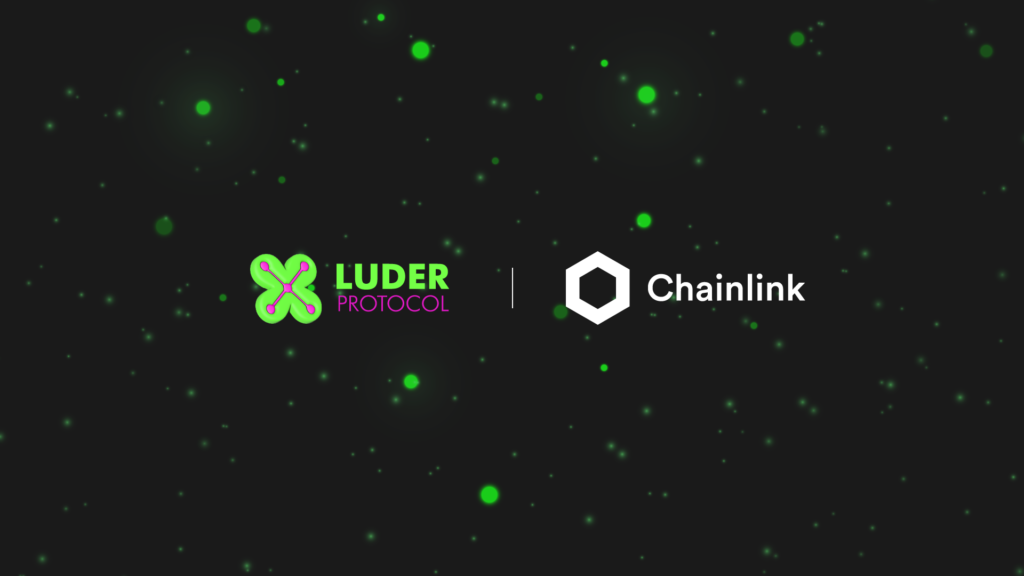
We’re excited to announce that Luder Protocol—a token prototype with an automatic raffle system for holders—has integrated Chainlink Verifiable Random Function (VRF) on BNB Chain mainnet. By integrating the industry-leading decentralized oracle network, we now have access to a tamper-proof and auditable source of randomness needed to help randomly select raffle winners from the list of participating holders. Ultimately this creates a more exciting and transparent user experience, as users can be sure that they have an equal chance of winning and can verify the randomness of the results throughout the process.
Luder Protocol is an innovative BEP-20 token protocol that combines a decentralized and automated raffle system with a token function. This protocol offers a unique solution for users who are looking for a decentralized and automated way to generate profits in cryptocurrencies. Luder Protocol uses a smart contract to retain a token tax on each purchase (6%) or sale (9%) transaction on the main DEX for which it has been implemented.
The accumulated tokens are converted to BNB and sent to a sub-contract that is responsible for storing the prize for the current raffle round. The token contract is the one that manages and constantly evaluates the funds of the sub-contract in each transaction.
When the amount accumulated in this sub-contract equals or exceeds the minimum stipulated by the token contract (defined in ‘_lotteryExecuteAmount’), the contract executes the raffle round function and selects an address, randomly, from an index of participating holders’ list (in ‘_listOfHolders’), which must have a minimum amount of tokens (defined in ‘_minAmountToParticipate’), and sends the accumulated funds in the raffle round sub-contract to them.
In order to help ensure the transparency of the results in raffle rounds, we needed access to a secure random number generator (RNG) that any user could independently audit. However, RNG solutions for smart contracts require several security considerations to prevent manipulation and ensure system integrity. For instance, RNG solutions derived from blockchain data like block hashes can be exploited by miners/validators, while off-chain RNG solutions derived from off-chain APIs are opaque and don’t provide users with definitive proof about the integrity of the process.
After reviewing various solutions, we selected Chainlink VRF because it’s based on cutting-edge academic research, supported by a time-tested oracle network, and secured through the generation and on-chain verification of cryptographic proofs that prove the integrity of each random number supplied to smart contracts.
Chainlink VRF works by combining block data that is still unknown when the request is made with the oracle node’s pre-committed private key to generate both a random number and a cryptographic proof. The Luder Protocol smart contract will only accept the random number input if it has a valid cryptographic proof, and the cryptographic proof can only be generated if the VRF process is tamper-proof. This provides our users with automated and verifiable assurances directly on-chain that selection of winners is provably fair and was not tampered with by the oracle, outside entities, or the Luder Protocol team.

Our goal is to build a decentralized ecosystem of tools. One of our objectives is to evaluate the performance of this prototype in order to integrate it into our decentralized SaaS (Software as a Service) platform called PowaDAP. In this way, we seek to offer, in addition to multiple services, a system for generating tokenized raffles for various projects and dynamics of our clients, with the utility enhanced in relation to the transparency and security that Chainlink solutions can offer us.
“Chainlink VRF provides us with the ability to offer our users complete transparency when it comes to the randomness used in the raffle winner selection process.”–Dev Mexos, Product Developer
About Chainlink
Chainlink is the industry-standard Web3 services platform that has enabled trillions of dollars in transaction volume across DeFi, insurance, gaming, NFTs, and other major industries. As the leading decentralized oracle network, Chainlink enables developers to build feature-rich Web3 applications with seamless access to real-world data and off-chain computation across any blockchain and provides global enterprises with a universal gateway to all blockchains.
Learn more about Chainlink by visiting chain.link or reading the developer documentation at docs.chain.link. To discuss an integration, reach out to an expert.
About Luder Protocol
To get more information about Luder Protocol, visit our website, join our communities and follow us on our social media networks.
Web: luderprotocol.com
Telegram Group: @LuderProtocol
Twitter: @LuderProtocol
E-mail: [email protected]
BEP-20 Contract: 0x78bF461c692E5344c8788bc7D54d8b6C89902e30

